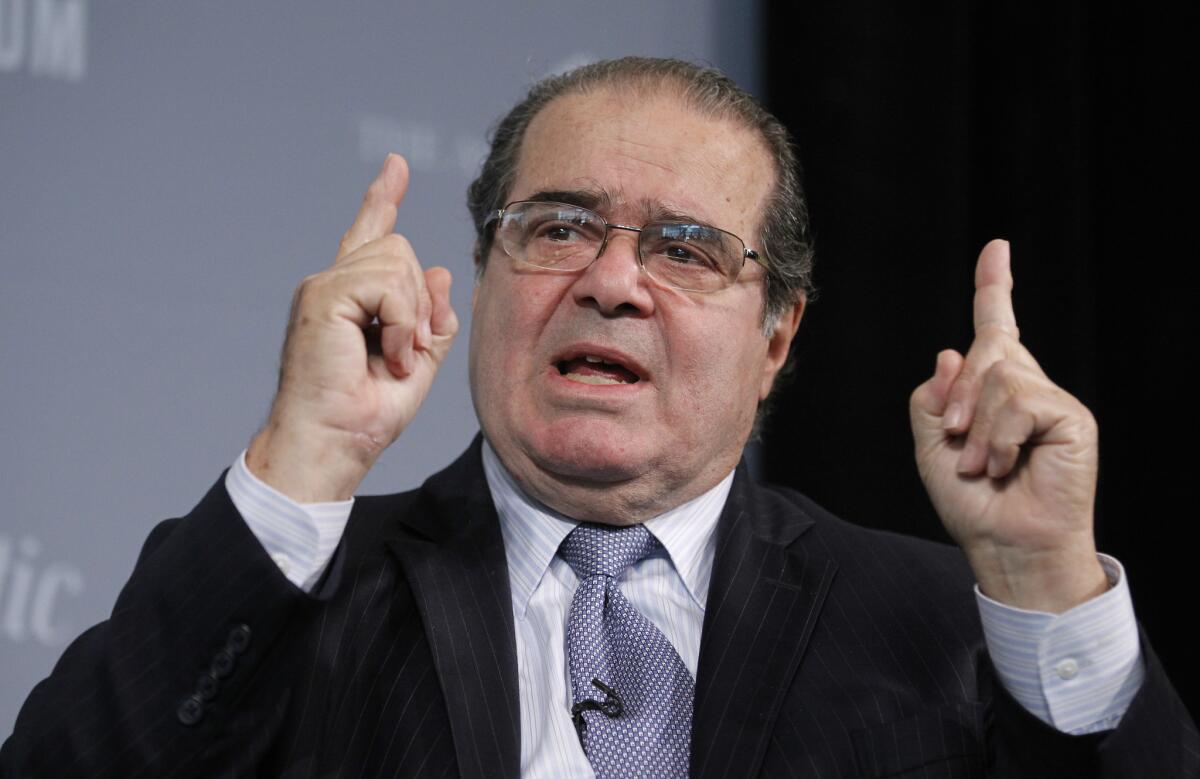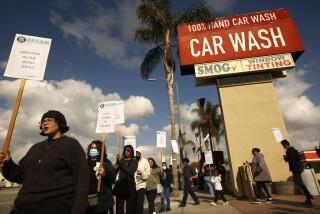How Scalia’s death may save teachers unions -- for now

Supreme Court Justice Antonin Scalia died over the weekend, potentially affecting cases before the court, including an attempt to limit the financial reach of teachers unions.
The death of Supreme Court Justice Antonin Scalia could deal a major blow to a California lawsuit that had been widely expected to weaken the financial muscle of teachers unions across the country.
In Friedrichs vs. California Teachers Assn., many court watchers had expected Scalia to deliver the deciding vote against unions, limiting their ability to collect membership dues and other fees. Without Scalia, a 4-4 split is considered likely. That would maintain the status quo — a huge win for unions, at least for now.
Though union opponents could mount a new case, that would probably take at least another year, said Jeffrey H. Keefe, a research associate at the liberal-leaning Economic Policy Institute.
“So the conflict shifts to President Obama’s ability to appoint a replacement or who will win the presidential election,” Keefe said.
The case was brought by Rebecca Friedrichs, an elementary school teacher in Orange County. She and nine other plaintiffs opted not to join their local teachers unions but were required to pay the union so-called fair-share fees because they benefited from representation in contract negotiations that determined salaries and benefits. These fees cannot be used to support the union’s political activities.
Friedrichs challenged the constitutionality of those fees, arguing that being forced to support an organization whose views they disagreed with violated their free-speech rights.
The plaintiffs also complained about a law that requires teachers to opt out of union membership every year. If they don’t, they become members by default, with dues automatically deducted from their pay.
Instead, the plaintiffs want the law changed so that teachers who wish to be union members would have to opt in every year. A similar change in Wisconsin contributed to a more than 50% decline in membership over the last five years in the Wisconsin Education Assn. Council, that state’s largest union for grade school educators.
In the past, Scalia had considered employees like Friedrichs to be “free-riders.” If these free riders didn’t have to pay the union for its work representing them at the bargaining table, no one would have an incentive to join.
That reasoning was enshrined in a unanimous 1977 Supreme Court case called Abood vs. Detroit Board of Education.
Since Abood, the legal and political landscape has shifted and polarized, said Trevor Burrus, a research fellow at the libertarian Cato Institute.
“Academics have built up a scholarly case against [fair-share] agency fees for public-sector unions. On the other side, those on the left believe that unions are a necessary foundation for a prosperous society, and, if anything, they should be expanded. There is no middle ground between these positions.”
Gloria Romero, a Friedrichs supporter and founder of California Center for Parent Empowerment, said that the case is fundamentally about limiting the flow of money to unions — and properly so. Union leadership does not reflect the views of many teachers, and unions block reforms that would benefit students, she said.
Dues and fees are the “main source” of union funds, she added: “It’s an autopilot infusion of cash. Until the money stream is stopped, there is no fair playing ground.”
When the case was argued before the Supreme Court in January, Scalia was “dubious about both the need to charge non-members a fee and the consequences [to unions] if the court were to strike down the fees,” wrote attorney Amy Howe, editor of the influential SCOTUSblog, after reviewing comments and questions from the justices.
Join the conversation on Facebook >>
And if the union’s work was so important, it should be able to persuade teachers to sign up, Scalia indicated.
To Howe it looked as though the four more-liberal justices had given up trying to preserve the fees on the merits of the union’s case. They suggested instead that it was poor practice and potentially risky to overturn long-established procedures without sufficient cause.
That logic apparently made little headway.
Instead, Scalia appeared to agree with Friedrichs that when unions represent public employees, their activities are inherently political, and that forcing a teacher to pay union fees infringed on her right to freedom of expression.
“The problem is that everything that is collectively bargained with the government is within the political sphere, almost by definition,” Scalia said, according to a transcript of the Jan. 11 oral argument. “Should the government pay higher wages or lesser wages? Should it promote teachers on the basis of seniority … all of those questions are necessarily political questions.”
At the time, pro-union columnist Harold Meyerson was discouraged.
“Whatever faint hopes the labor movement had entertained that it might retain the support of Antonin Scalia, who’d upheld the judgment of Abood in previous opinions, were made fainter still by Scalia’s comments,” Meyerson wrote in the American Prospect.
Scalia’s death at 79 has upended expectations. But this new ground is only as solid as the health of the four liberal justices — Ruth Bader Ginsburg, 82, has seemed especially frail — and, of course, the politics of the president who appoints the next justices, experts said.
Union membership in the U.S. has diminished precipitously over the last few decades. Fifty years ago, about 28% of U.S. workers were union members, according to the Bureau of Labor Statistics. By 2015, that figure had dropped to 11%, the bureau reported.
Unions representing government workers, including those for teachers, remain the strongest, although their power varies from state to state. Here, the California Teachers Assn. is one of the state’s most influential interests, and United Teachers Los Angeles long has been a major political player in local affairs.
The union’s total revenue, however, has been shrinking as enrollment in the L.A. Unified School District has declined — and the number of union teachers has declined in tandem.
Until recently, UTLA collected $685 per teacher in annual membership dues and charged $550 in fair-share fees to nonmembers. Just last week, union members overwhelmingly agreed to increase their annual dues to nearly $1,000. Union leaders argued that the money was needed to limit the rapid growth of nonunion charter schools, among other issues.
Labor leaders say they are trying to hold their ground against deep-pocketed anti-union interests that have targeted unions and their members on multiple fronts.
One example is a lawsuit brought on behalf of student Beatriz Vergara and others who challenged California’s tenure rules and other teacher job protections. A Los Angeles Superior Court judge threw out those laws in 2014, ruling that they harmed students by keeping incompetent teachers in classrooms. The California Teachers Assn., the California Federation of Teachers, Gov. Jerry Brown and others are appealing the verdict.
Scalia’s death, though unfortunate in human terms, represents a tactical gain for unions, said Joshua Pechthalt, president of the California Federation of Teachers. But even if Friedrichs fails, “there will be other attacks against teachers unions.”
“We’ve got to do the internal work of engaging our members and we’ve got to make our case to the public that the kind of change we want is the kind of change they want,” Pechthalt said.
Twitter: @howardblume
Editor’s note: The Times receives funding for its Education Matters digital initiative from one or more groups alluded to in this article. The California Community Foundation and United Way of Greater Los Angeles administer grants from the Baxter Family Foundation, the Broad Foundation, the California Endowment and the Wasserman Foundation to support this effort. Under terms of the grants, The Times retains complete control over editorial content.
ALSO
Supreme Court Justice Scalia dies at 79
What happens with a divided Supreme Court? A look at the key cases
Obama vows to fill vacancy on Supreme Court, setting up clash with Republicans
More to Read
Start your day right
Sign up for Essential California for news, features and recommendations from the L.A. Times and beyond in your inbox six days a week.
You may occasionally receive promotional content from the Los Angeles Times.






